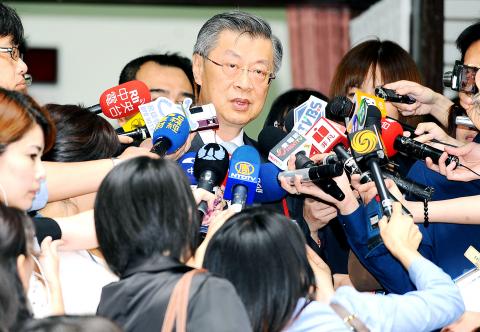|
Capital gains tax
controversy continues
‘PSEUDO-REFORM’? The opposition said the
8,500-point threshold for the TAIEX and delayed adoption of a tax system based
on actual gains ‘perpetuate uncertainties’
By Shih Hsiu-chuan / Staff reporter

Premier Sean Chen said the
Cabinet is seeking to put a capital gains tax on securities in place and will
then pursue a better tax in the future.
Photo: Taipei Times
The controversy over a plan to levy a
capital gains tax on securities investments continued yesterday, with the
opposition describing the latest government proposal as “pseudo-reform” causing
a stock market “disturbance.”
“[We wish to] have a capital gains tax on securities in place, then [we can
pursue] a better one [in the future],” Premier Sean Chen said when asked about
the wide criticism the proposal has drawn.
The latest proposal represents a combination of the Cabinet’s previous version,
under which individual investors would be taxed based on actual gains, and a
Chinese Nationalist Party (KMT) caucus version, under which the tax would be
activated only when the TAIEX goes above 8,500 points.
A new version was negotiated late on Thursday night and the government was
hoping to receive the endorsement of KMT lawmakers at a party caucus meeting
yesterday, ending months of tension between the Cabinet and lawmakers over the
tax reform policy that President Ma Ying-jeou (馬英九) has pledged to move forward
with.
However, some KMT lawmakers remained opposed to the proposal.
Following the caucus meeting, KMT legislative caucus whip Lin Hung-chih (林鴻池),
who was involved in negotiating the latest version, said: “Further discussion
among caucus members is needed before a consensus can be achieved.”
The new version proposes a “dual-track mechanism” for individual investors from
next year through 2016, under which individual investors, except for “the rich”
as defined by the proposal, can choose to either have their tax calculated based
on the index level or have their capital gains included in the calculation of
their annual income.
During the application of the dual-track mechanism, wealthier people and those
living in the country for fewer than 183 days a year are not allowed to use the
index-based method.
Starting in 2017, the dual-track mechanism would be eradicated and ordinary
individual investors would be exempt from tax on income derived from the trading
of securities, but the tax would still be imposed on “market makers,” the rich
and people living in the country for fewer than 183 days a year.
The proposal defines “market makers” as people who sell more than NT$1 billion
(US$33.4 million) of securities in the year and “the rich” as shareholders of
listed companies who own more than a 1 percent stake or people whose annual net
income, other than income earned from securities trading, exceeds NT$3 million.
An individual investor is required to pay taxes based on actual gains earned
from initial public offerings (IPOs) if the investor holds more than 10,000
shares of IPO shares, unlisted shares and shares listed on the emerging market.
KMT Legislator Lo Shu-lei (羅淑蕾) opposed the latest version for two reasons.
The tax payment method under the dual-track mechanism tied to the index level
would discourage investors from trading in higher-priced shares, which have
greater weighting in the index, to keep the index from reaching the threshold,
Lo said.
Lo said it was unfair on certain investors because “transactions of IPO shares,
unlisted shares and shares listed on the emerging market are [automatically]
subject to taxation, but trading of shares in listed firms would not be [if the
TAIEX is below 8,500 points].”
KMT legislators Alex Tsai (蔡正元) and Lai Shyh-bao (賴士葆) both praised the proposal
that they helped draft.
The new proposal would have a minimal impact on the stock market in terms of the
number of individual investors affected, about 20,000 people under the
dual-track mechanism if the index is below 8,500, and 40,000 people after 2017,
they said.
They said the proposal promotes justice and fairness, because the tax would
mainly be levied on the rich, who have the ability to pay.
The eradication of the “dual-track mechanism” in 2017 was one of the major
revisions made to the previous version advocated by the KMT caucus.
Chen, who did not express his view on the much-criticized index-based system,
yesterday said that “everyone knows that tax payment method would not be a
durable system.”
“It was reasonable to introduce a sunset clause to eradicate the method,” Chen
said.
Lawmakers from the Taiwan Solidarity Union (TSU), the Democratic Progressive
Party (DPP) and the People First Party (PFP) also criticized the proposal.
They said the Ma administration could not afford to fail to carry out the tax
reform plan, so it had negotiated a new version, but the proposal would do more
harm to capital markets than good.
TSU Legislator Hsu Chung-hsin (許忠信) said the combined version was nothing but
“pseudo-reform.”
The government estimated that the proposal would generate a tax revenue of about
NT$15 billion annually, but DPP Legislator Hsu Tain-tsair (許添財) expressed doubt.
“A reform has to be put into effect immediately. This version is certainly not a
reform, because a tax system based on actual capital gains would not be
implemented for four years,” he said.
Hsu was also suspicious of how effectively the tax would be collected.
“To implement a tax system based on actual gains four years later opens up the
possibility that the policy could be revised so that the rich and market makers
could avoid the tax,” he said.
The threshold of 8,500 points on the TAIEX and the sunset clause for the
adoption of a tax system based on actual gains “perpetuate uncertainties” and
“disturb” capital markets, he said.
PFP Legislator Thomas Lee (李桐豪) said the proposal would hamper the development
of the nation’s capital markets and fail to levy taxes on medium-sized
investors.
|
![]()
![]()
![]()